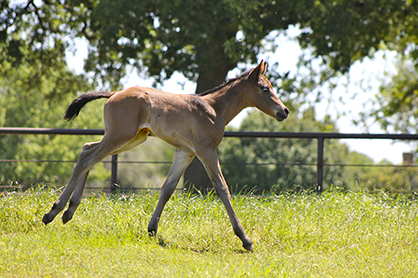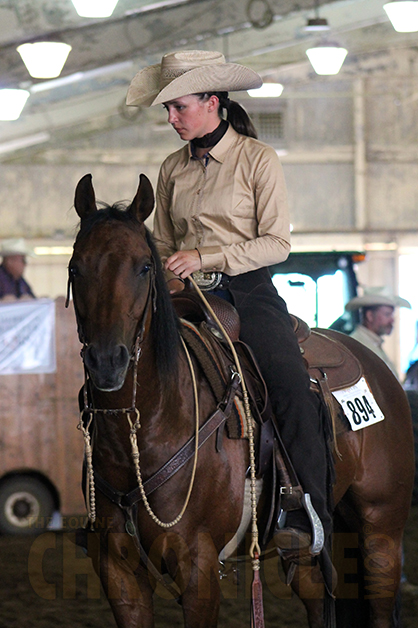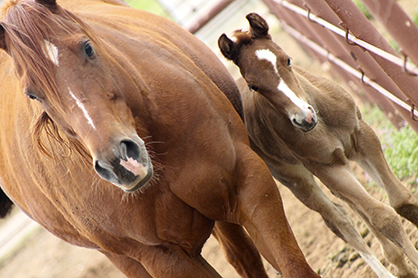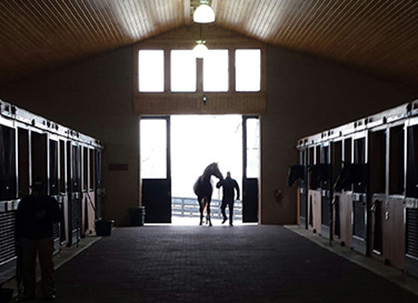Western Pleasure Added to APHA’s Horse IQ Program
March 28, 2018 Comments Off on Western Pleasure Added to APHA’s Horse IQ Program
This is an innovative lesson that has two, four horse classes to judge with explanation, and over 30 movement clips to analyze with explanation.This lesson also provides examples of all gaits levels with explanation, and many more great lessons about what judges are looking for in western pleasure.
Continue reading …Little Lungs: The Effect of Ammonia in Foals
March 23, 2018 Comments Off on Little Lungs: The Effect of Ammonia in Foals
About 15 percent of all foals have severe respiratory disease before they reach the end of their first year, Harper says in a study. “It is important to reduce the level of ammonia in foaling stalls, and all stalls in barns where foals reside,” he writes.
Continue reading …Horse Trailer TERMS You Should Know
March 22, 2018 Comments Off on Horse Trailer TERMS You Should Know
GVW – The Gross Weight for the trailer is the trailer’s loaded weight to include horses, all equipment, hay/feed etc. A tow vehicle’s GVW includes passengers, fuel, fluids, and payload.
Continue reading …Pros and Cons- How the New 2018 USA Tax Law Could Affect Your Horse Business
March 21, 2018 Comments Off on Pros and Cons- How the New 2018 USA Tax Law Could Affect Your Horse Business
Notable equine law and tax attorney, Paul Husband will present a free webinar for all horse owners and equine business professionals on Monday, March 19th at 5:30 p.m. PST / 8:30 p.m. EST. Hundreds have already registered, and space is filling quickly. To reserve your spot, visit www.equestrianprofessional.com and click “Free Resources” or access the direct link at http://www.equestrianprofessional.com/public/Free-Webinar-Pros-and-Cons-How-the-New-USA-Tax-Law-Could-Affect-Your-Horse-Business.cfm\
Continue reading …Why is Tall Fescue Problematic For Pregnant Mares?
March 20, 2018 Comments Off on Why is Tall Fescue Problematic For Pregnant Mares?
Pregnant mares consuming endophyte-infected tall fescue can suffer an array of problems, including:
-Prolonged gestation and subsequent birthing difficulties:
-Abortion or stillbirth;
-Premature separation of the placenta, known as red bag;
-Thickened or retained placenta; and
-Decreased or absent milk production, including colostrum.

Fresh spring grass is very appealing, and horses can chomp through an incredible amount of forage in a relatively short time. So how can this readily available, appealing, natural forage be dangerous for some horses and ponies?
Continue reading …Mare Obesity Impacts Foal Health and Osteochondrosis
March 9, 2018 Comments Off on Mare Obesity Impacts Foal Health and Osteochondrosis
European researchers recently explored how mare obesity at time of artificial insemination impacted foals up to 18 months of age.
Continue reading …Horizon Structures Presents Series- Finishing Touches for Your New Barn
March 8, 2018 Comments Off on Horizon Structures Presents Series- Finishing Touches for Your New Barn
For blankets, the ideal situation is a tall wall glide system that hangs the blankets at full length. However, not everyone has room for this luxury. Blanket bars can be fabricated out of plumbing pipe on stall doors, or a rubber coated chain can be hooked onto the outside of the stall door.
Continue reading …Colic: Better Options, Better Outcomes
March 8, 2018 Comments Off on Colic: Better Options, Better Outcomes
The biggest controllable determinant for a successful surgical outcome is minimizing the duration of clinical signs before surgical intervention. Early correction of twisted intestines can obviate the need for costly resections (removal of sections of intestines). In addition, timely intervention can limit the collateral damage to the intestine, which can lead to serious disruptions in propulsive motility requiring lengthy hospital stays, increased cost and complications such as adhesions.
Continue reading …Foal Patrol! Live Feed Lets You Watch as Mares’ Approach Foaling Date
March 7, 2018 Comments Off on Foal Patrol! Live Feed Lets You Watch as Mares’ Approach Foaling Date
“I truly believe, once you see a foal born, you will never be the same.”
Continue reading …







